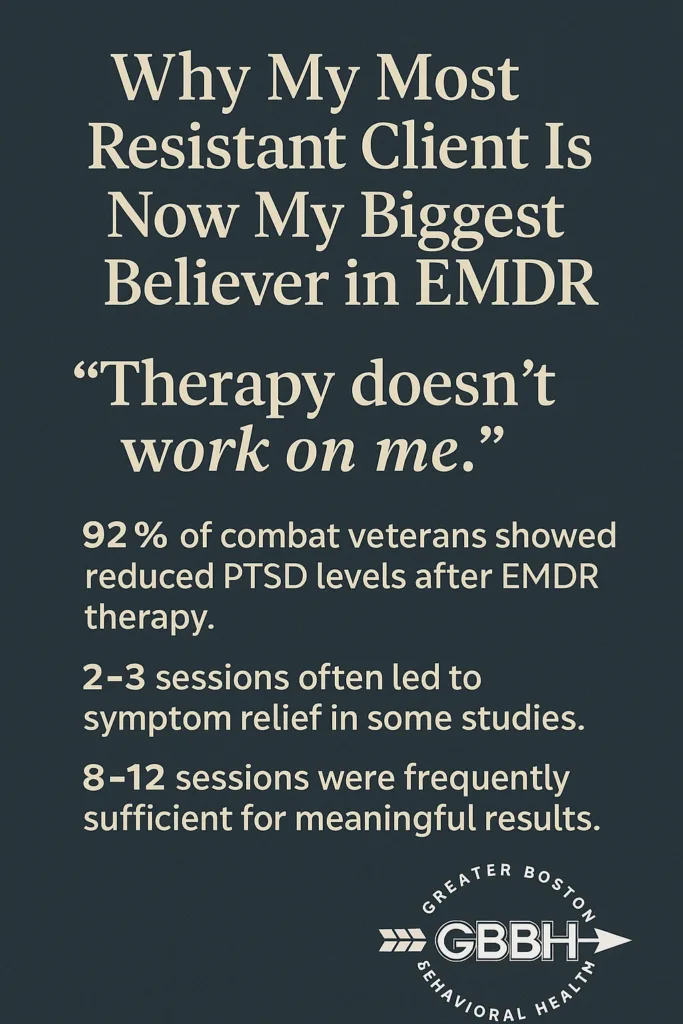I’ve had clients cry during intake. I’ve had clients go silent for full sessions. But the ones I remember most? The ones who show up and immediately tell me therapy is a waste of time.
One of those clients is now the most vocal advocate for EMDR in our program.
He didn’t walk in looking for healing. He came in daring me to fail him again. If you’ve ever felt like therapy “didn’t work” for you—or like maybe you’re just unfixable—this story is for you.
And if you’re still not sure whether EMDR is worth trying, let me walk you through why it helped when nothing else did.
“Therapy Doesn’t Work on Me.”
That’s the first thing he said. No hello. No small talk. Just a wall.
He had tried therapy before—three times, to be exact. One was a therapist who nodded too much. One pushed worksheets. One barely let him speak. He wasn’t just burned out. He was bitter.
“Don’t expect me to spill my guts,” he said. “I’ve already told my story. It didn’t help.”
I didn’t argue. Honestly, I agreed with him. If therapy means retelling the same painful memory while someone takes notes and nods sympathetically? I wouldn’t trust that either.
But what he didn’t know was that EMDR isn’t talk therapy. And for some people—especially the ones who feel like words have failed them—it can be a completely different door.
Why EMDR Was the One That Broke Through
Eye Movement Desensitization and Reprocessing (EMDR) sounds strange the first time you hear about it. Eye movements? Trauma processing without having to say everything out loud? For someone like him, that was actually part of the appeal.
He didn’t have to perform his pain. He didn’t have to explain it to make it real. He just had to follow the steps.
The first few sessions felt awkward. He rolled his eyes more than once. But he kept showing up. Why? Because for the first time, therapy didn’t require him to make it make sense.
EMDR met him where he was.
And slowly, something started to shift.
“I Didn’t Think This Would Work. But…”
I remember the day he said those words. It was our fourth EMDR session.
He came in quieter than usual. No sarcastic jabs. No arms folded. He sat down and said:
“The memory doesn’t feel like it’s clawing at me anymore. It’s still there. But it’s quieter.”
This wasn’t some miracle. It was the nervous system doing what it’s wired to do—finally getting a chance to process what had been stuck on repeat.
He didn’t need to believe in it for it to work. He just had to be willing to sit with the process.
And from that point on, he stopped trying to prove therapy wrong. He started letting it help.
The Truth About Skepticism
Let me say this clearly: If you’ve felt like therapy didn’t work for you, you’re not wrong. Not every approach helps every person. And if you’re someone with complex trauma, high emotional walls, or even just a deep need to stay in control—traditional talk therapy can feel more like salt in the wound than healing.
But that doesn’t mean healing isn’t possible.
EMDR doesn’t ask you to explain everything. It doesn’t require you to cry on cue. It gives your brain a safe, structured process to finally move the pain somewhere besides the front of your mind.
And for many of the most skeptical clients I’ve seen, that difference is everything.
Looking for EMDR in Boston, MA?
If you’re in the Greater Boston area and have been thinking about trying therapy again—but feel guarded, cautious, or even flat-out doubtful—it might be time to try something different.
Looking for EMDR in Boston, MA? We offer specialized trauma therapy services, including EMDR, right here in the city and nearby locations like Dedham and Needham.
At Greater Boston Behavioral Health, our EMDR therapists are trained to work with people who are not easy clients. People who’ve been through the system. People who are skeptical. People who’ve already tried.
You don’t need to be convinced. You just need to be willing.
What Changed for Him?
By the end of his treatment, he was sleeping better. His startle reflex had calmed. He wasn’t obsessively replaying arguments or moments of shame in his head. The memories were still there—but the charge was gone.
The man who once told me, “This won’t work,” now tells other clients, “EMDR is weird, but it helped me more than anything else.”
He didn’t become a brand-new person. He just became someone who could finally breathe.
Why This Matters for You
You might not believe in EMDR. That’s okay. This isn’t a commercial.
But if you’ve been through treatment before and felt like you were just spinning your wheels—if you’ve ever walked out of a therapy session more frustrated than when you walked in—then EMDR might offer something new.
Something quieter. Something that doesn’t rely on performance or explanation.
It’s not about talking. It’s about processing.
And for people who’ve felt failed by therapy before? That difference can be life-changing.
Frequently Asked Questions About EMDR Therapy in Boston
What is EMDR and how does it work?
EMDR (Eye Movement Desensitization and Reprocessing) is a structured therapy designed to help your brain reprocess distressing memories. It uses bilateral stimulation (like eye movements or tapping) while you recall specific memories—helping reduce the emotional intensity tied to those experiences.
Do I have to talk in detail about my trauma?
Not in the way traditional talk therapy requires. EMDR allows you to focus internally, with less verbal explanation. You guide the pace. You don’t need to relive every detail out loud.
How long does EMDR therapy take to work?
Some clients notice shifts in 2–4 sessions, while others may take longer. It depends on the complexity of the trauma and how ready your nervous system is to process. Many clients experience meaningful relief within 8–12 sessions.
Is EMDR safe for everyone?
EMDR is safe for most people, but it’s important to work with a licensed, trauma-informed clinician—especially if you have a complex trauma history, dissociation, or severe anxiety. Our team conducts thorough assessments before beginning treatment.
Can I get EMDR therapy in Boston?
Yes. Greater Boston Behavioral Health offers EMDR therapy with trained clinicians at our Boston location, as well as in surrounding communities like Dedham and Needham. You can learn more about our services here.
Final Thoughts from a Clinician
If you’re someone who once said, “Therapy didn’t work,” I hear you. That’s not a sign of failure. That’s a sign that you still want relief—even if you’re too tired to chase it.
EMDR isn’t a fix-all. But for people like my most skeptical client, it was the door that finally opened.
You don’t have to believe in it for it to help.
You just have to walk through that door—one session at a time.
Call (888) 450-3097 or visit our EMDR therapy page to learn more about EMDR services in Boston, Massachusetts. Healing doesn’t have to start with belief. Sometimes it starts with just showing up.


